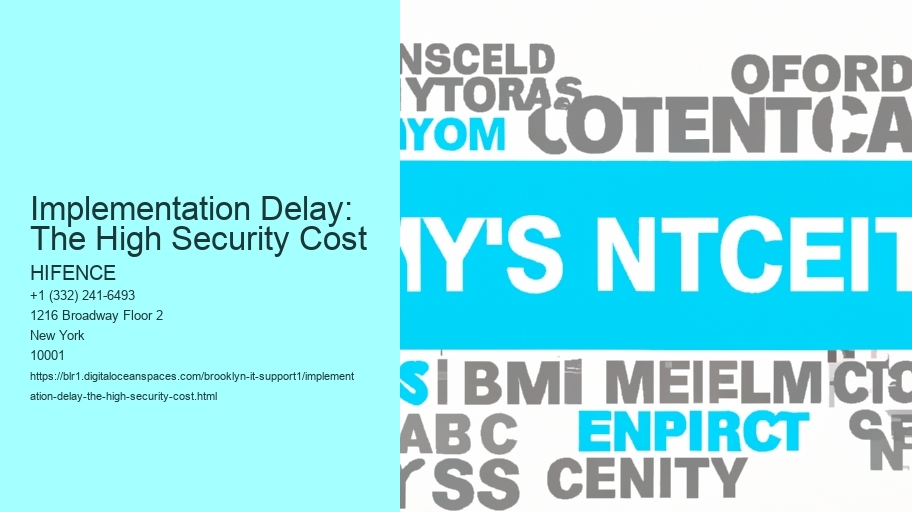
Understanding Implementation Delay for Implementation Delay: The High Security Cost
Okay, so youre thinking implementing a new security measure is just flipping a switch, right? Metrics: From Theory to Practical Implementation . Wrong! Understanding implementation delay is crucial cause its not just about how long it takes to, like, install the software. Its about everything that happens before and after, and boy, can that stuff add up!
Think about it. Theres the initial assessment, figuring out what ya actually need. Then comes the selection process, comparing different options, which aint always straightforward. And dont forget the training! Your staff gotta know how to use the new system, or its basically useless.
Honestly, this delay isnt some abstract concept; it has real-world consequences. The longer it takes to implement better security, the longer youre vulnerable to threats. A data breach could happen easily, and the cost of that could be astronomical! Lost revenue, lawsuits, reputational damage...yikes!

It aint just a matter of money, neither. A slow roll-out can lead to employee resistance. If theyre not properly informed or trained, they might see the new security protocols as a burden, finding ways to circumvent them, defeating the purpose entirely.
So, yeah, understanding the potential delays and planning for them proactively is essential. Its a delicate balancing act, but neglecting it could mean paying a hefty price down the line!
Okay, so, like, implementation delay when it comes to security? Its not just a paperwork shuffle, yknow? It can seriously open up holes a criminal could drive a truck through! Think about it: a new patch comes out addressing a nasty flaw. If youre dragging your feet getting it installed, youre basically leaving the front door unlocked.

And it isnt just about patches, either. If youre putting off upgrading to a more secure system cause its a hassle or costs a bit, well, youre sticking with outdated tech thats probably riddled with known vulnerabilities. These arent secrets! Bad actors are actively looking for these weaknesses.
Frankly, the longer you wait, the greater the window of opportunity. Cyberattacks arent gonna politely hold off while you get your act together. A delay is basically inviting trouble. Its like... saying, "Hey, come on in and help yourself to our data!" Nobody wants that, right? So, yikes, dont procrastinate on security; its a recipe for disaster!

Okay, so think about it: putting off security measures when youre implementing something, yeah, it aint just a minor oopsie. Its more like opening a can of financial worms! I mean, imagine youre building a new system, but youre like, "Nah, lets deal with the firewalls and encryption later, we got deadlines!"
Well, delayed security, it doesnt just mean youre more vulnerable to attacks, which, yikes, is bad enough. It also means, potentially, huge costs down the road. Think about the data breaches, man. The fines alone can bankrupt a company! Not to mention the damage to your reputation, which is, like, priceless (in a bad way).
And then theres the cost of actually fixing the problems later. Its always cheaper to build security in from the start than to bolt it on afterwards. Plus, retrofitting? Its never as good, is it? Youre always left with vulnerabilities that are, like, lurking in the shadows.
So yeah, delaying security because you think its a time-saver, or money-saver? Its a huge gamble that almost certainly wont pay off. Its a recipe for financial disaster, and nobody wants that!

Okay, so, like, the thing with implementation delays when youre dealing with high security costs? Ugh, its a disaster waiting to happen. It aint just about the money, yknow! Its about what folks think about you afterwards. Were talking about serious reputational damage, right?
Think about it. You promise top-notch security, you boast about protecting everyones data, and then… nothing. check The systems delayed, maybe there are glitches, or worse, theres a breach cause you werent ready. Thats gonna sting. People aint gonna forget that easily.

And loss of trust? Thats a killer! Once people dont believe you can keep them safe, theyre gonna find someone else who can. You cant just buy back that faith, can you? Its earned, and a big delay coupled with security holes? Well, it just aint a good look! It aint just about fixing the tech; its about rebuilding that confidence, and that takes time and a whole lotta effort. Ouch! You better believe that delay will haunt you for ages. You dont want that!
Oh boy, implementation delays, right? Theyre never just a minor inconvenience, especially when were talkin high security systems. Think about it: a banks new fraud detection software held up for months cause of some vendor issue? That aint just a budget problem, its a freakin invitation to cybercriminals!
I mean, these delays, they aint happening in a vacuum. While your new, shiny security is stuck in development hell, your old security is probably gettin creaky. Vulnerabilities are discovered, patches arent applied as quickly, and the bad guys? Theyre not exactly sitting around twiddling their thumbs, are they?
Weve seen case after case, you know, where a delayed security upgrade directly led to breaches. Like, that hospital system that got totally ransomed because their planned firewall update got bogged down? Devastating.
And its not just about the technical aspects, neither. managed services new york city Delays breed uncertainty, they can erode trust within an organization. Staff get frustrated, they might even cut corners, undermining existing security protocols. Its a domino effect, really. managed services new york city So, yeah, delaying that new security implementation? It aint just about missing a deadline; its a gamble with potentially disastrous consequences. Yikes!
Implementation delays in high-security projects?
First off, we need super clear, well-defined scopes. Ambiguity? Thats a recipe for delays, I tell ya! Everyone needs to know exactly whats expected, and that means communicating, communicating, communicating! No one likes feeling lost, and that creates errors, you know?
Then theres the whole vendor management thing. Are they performing? Are they delivering on time? Dont just sit back and hope for the best. Regular check-ins, constant monitoring – its crucial. Poor vendor performance can cause massive setbacks and cost a bomb.
Contingency planning is another biggie. What if something goes wrong? And trust me, something will go wrong. managed service new york Having backup plans in place, alternative solutions ready to roll, that can save you a ton of time and money down the line. It isnt something you can skip, believe me!
And finally, this sounds simple, but its often overlooked: get stakeholder buy-in early! If you dont have everyone on board from the start, youre gonna face resistance, delays, and increased costs. Honestly, it's like herding cats, but its worth the effort! So, yeah, mitigation isnt easy, but its absolutely necessary if we want to keep those security cost from spiraling out of control!
Okay, so, like, imagine youre building a house, right? And youre all hyped about getting a super secure, top-notch security system installed. You know, motion sensors, reinforced doors, the whole shebang. But, uh oh, theres a delay. The installation crew is backed up, or maybe the special order doors havent arrived yet. Bummer!
That delay aint just an inconvenience; its a cost. Were talkin about the cost of not having that security in place. Think about it. Your house is more vulnerable during that time! Maybe someone could try to break in. Maybe your insurance rates are higher cause you dont have the alarm system yet. Its a real bummer!
Measuring this "cost of delay" isnt always easy, though.
The longer the delay, the higher the potential cost. Its like, the longer you leave the door unlocked, the greater the opportunity for something bad to happen. So, understanding and measuring the cost of delay for security implementation is super important. It helps you prioritize things and make sure youre not letting potential risks linger longer than they should! Isnt that important!